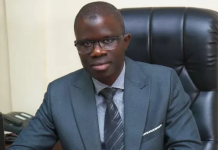By Mariama Marong
Momodou Tangara, Minister of Foreign Affairs, International Cooperation and Gambians Abroad, said cybercrime has emerged as a grave concern that is affecting nations worldwide, as it is transcending boundaries.
Foreign Minister Tangara said this statement during the opening ceremony of a four-day training on cybersecurity and cybercrime for public officials. Held at the Sir Dawda Kairaba Jawara International Conference Centre, the training was organised by the Rule of Law and Anti-Corruption Center (ROLACC) in The Gambia. The objective of the training is to provide public officials with information on the issue in order to prevent potential cyber threats and attacks before they take place and to also develop understanding of the tools available to counter actual attacks.
According to the Minister, the training programme holds immense importance in their collective efforts to achieve the United Nations Sustainable Development Goals, the African Union Agenda 2063, and the ECOWAS cybersecurity strategy. He added that, as they strive to create a prosperous and inclusive future, it is vital that they address the challenges posed by cybercrime and strengthen our cybersecurity capabilities.
He said it is widely recognised that Cybercrime has become a global epidemic, with rapidly evolving threats that transcend borders, noting that the participants bear significant responsibility in safeguarding the nations from cyber threats. He said that governments rely heavily on digital infrastructure to deliver services, manage critical systems, and communicate with citizens, and therefore, it is paramount that “we equip ourselves”.
However, he said it is worthy to note that Africa, with its vibrant and rapidly growing digital landscape, is particularly vulnerable to the challenges of cybercrime, adding that as they strive to achieve a just and prosperous world, it is crucial that they address the intricate relationship between cybersecurity and sustainable development. Tangara said a secured and resilient digital environment is a prerequisite for inclusive growth, economic stability, and social progress.
Youssef Buhindi of ROLACC, who spoke on behalf of Dr. Al Bin fetais Al Marri, the chairperson of the United Nations Special Advocate for the prevention of corruption, added that cybercrime is one of the most dangerous threats to governments today, as it poses a significant threat in serving the people. He said by working together, they have delivered two previous training programmes in Doha, to help Gambian public officials understand cybercrime issues. He said they are happy to deliver this important workshop in Banjul, with world-class experts from ROLACC, UNITAR, the CIFAL network, and of course the Gambia’s Ministry of Communication and Digital Economy.






















